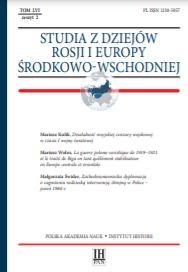Koncepcje federacyjne w II Rzeczypospolitej
Federation Ideas in the Second Polish Republic
Author(s): Jan Pisuliński Subject(s): Political history, Pre-WW I & WW I (1900 -1919), Interwar Period (1920 - 1939)
Published by: Instytut Historii im. Tadeusza Manteuffla Polskiej Akademii Nauk
Keywords: federation; Second Polish Republic; Piłsudski; Lithuania; Belarus; Ukraine;
Summary/Abstract: Between 1917 and 1921, there were numerous federation concepts in Poland formulated. Most of them were defined by the so-called Belvedere Camp associated with Józef Piłsudski, but also by other circles, including some conservatives. Federationist ideas were put forward mainly in the press, but they were also presented in the Legislative Sejm of the period. They responded to the growing national awareness of Lithuanians, Byelorussians, and Ukrainians in those areas of the Polish territory where Poles represented a significant and economically dominant minority. They usually postulated creating a federal state of three countries: Poland, Lithuania, and Belarus. There were also proposals to include other, nationally homogeneous regions – this was the so-called cantonal solution. Contrary to the view that has become well established in historiography, most projects of such a federation did not include Ukraine. There were also ideas of a wider union of nations from Finland to the Black Sea. The purpose was to create a solid federal state capable of withstanding the threat from Germany and Russia. However, the federation idea did not enjoy the support of Polish society, which favoured the direct incorporation of the eastern territories into the Polish state. Also, there were few supporters of the federalist ideas among Byelorussians, Lithuanians, and Ukrainians, as they feared Polish domination. The Riga Peace Treaty ended the federation plans, dividing the Byelorussian and Lithuanian lands between Poland and Soviet Russia.
Journal: Studia z Dziejów Rosji i Europy Środkowo-Wschodniej
- Issue Year: 56/2021
- Issue No: 2
- Page Range: 99-121
- Page Count: 23
- Language: Polish

